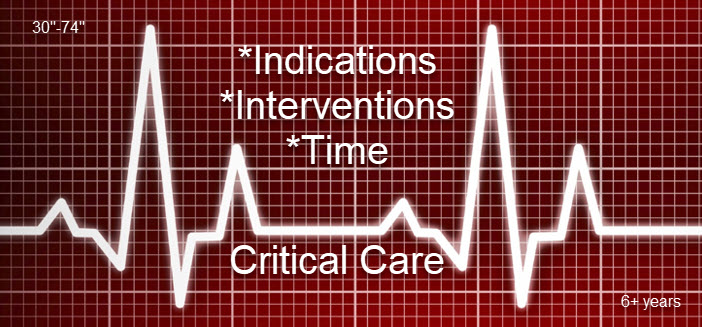Critical Care 101

A common misconception about Critical Care services is that the patient needs to be in a critical care unit in the hospital. That’s simply not the case. Critical Care, from a coding perspective, is a distinct set of services meant to save a person’s life, function, or prevent them from rapidly deteriorating, regardless of setting.
Critical Condition: CPT defines an illness or injury that acutely impairs one or more vital organ systems such that there is a high probability of imminent or life-threatening deterioration in the patient’s condition.
Critical Care is the “direct delivery by a physician(s) or other qualified health care professional of medical care for a critically ill or critically injured patient”.
Critical care codes are utilized when the care meets both of the following criteria:
- Critical illness or injury as defined by CPT®; and
- The treatment delivered involves “high complexity decision making to assess, manipulate, and support vital organ system function(s) to treat single or multiple organ system failure and/or prevent further life-threatening deterioration of patient’s condition.
Documentation should demonstrate that the patient was critically ill or injured during the care provided, include critical care interventions personally performed, and your total time (doesn’t have to be continuous) dedicated to providing critical care to the patient. If this criteria isn’t met, then other codes may be more appropriate. See Inpatient or Observation code set, or, if the criteria for age and weight have been met, look at the Intensive Care code set. Keep in mind, there is no “Intensive Care” code set for patients above the age of 28 days, or above the present weight of 500grams. Therefore, the patient will either be really sick, or have a critical illness or injury, there is no middle code.
CPT also describes the 99291/99292 code set to be set aside for ages 6 years and above, with some caveats, of course. For neonates, infants, and children (5 years and under), there a few things to consider before you report 99291 and 99292. Please see our Newborn Care Services article and Pediatric Critical Care tip sheet with decision tree for more details on reporting critical care for children 5 years old and younger. That said, below are a few exceptions to the 6+ age criteria for reporting critical care codes.
If you are a specialist, who is not primary, and who is NOT reporting the daily neonatal critical care service, then ask the following questions:
- Does the patient meet the criteria of having a critical condition (illness or injury)?
- Does the care for the patient include interventions that meet the criteria for critical care services?
- Does the time threshold meet the Critical care time criteria?
- 99291: 30″-74″ – first hour of critical care
- 99292: each additional 30″ (add-on code)
- How old is your patient? The patient must be 6 years of age or older, UNLESS:
- the patient is seen in an outpatient setting (e.g. Emergency Room)
- and…you are credentialed as a different specialty than the physician/ACP reporting the daily critical care (for age 5 or less)
- and…the care you are providing is medically necessary, not duplicative of the primary performing the daily critical care service, and is above and beyond a consultative service.
- then…you may report critical care codes 99291, 99292 on the same date as the primary who is reporting a daily neonatal critical care code.
- As long as you are a different specialty, treating a different critical care issue, most payers will reimburse your service. However, always be prepared to appeal. This means, make sure your documentation supports and clearly delineates all of the above.
Clinical Example:
Pediatric Critical Care is primary today for an 11 month old patient – they are directing the overall critical care team on the CHI (Children’s Heart Institute) unit for ARF. Pedi-Cardiology also saw the patient and spent 60” managing Cardiogenic Shock milrinone drip titration protocol. Who reports what?
Pediatric Critical Care – Reports Daily Code for the patient who is age 5 and under (11 months old). If the patient was 6+, they would report the aggregated time for the day with 99291, 99292. Managing different diagnosis than Pedi-Cardiology (ARF).
Pedi-Cardiology – Reports the time-based code 99291 as they are NOT the primary, they are NOT reporting the daily code, they are NOT the same specialty, they are not managing the same diagnosis (cardiogenic shock), and, the patient is being seen in the IP setting and are critically ill/injured.
Teaching Physician Guidelines
Keep in mind that Teaching Physician rules apply if you are performing Critical Care Services with a Resident, Intern, or Fellow. Remember, only critical care time spent by the Attending can be used in total time for Critical Care. Any time spent by the Resident in absence of the Teaching Attending may not be used in calculating total critical care time.
Shared/Split Guidelines
Shared/Split rules apply if you are performing service with an ACP (Advance Care Practitioner) and are reporting critical care with CPT codes 99291, 99292. Your documentation must include the appropriate statements for these cases.
Contact us!
If you would like more information, or education for your group, please contact Jay.McVean@uth.tmc.edu or Caroline.Wolbrecht@uth.tmc.edu. Additional scenarios are outlined regarding concurrent care (overlapping services), E/M and Critical Care on same day, and others, on the Novitas Critical Care Page.
Resource List:
Newborn Critical Care Tip sheet
(NEW!) February 2024 – Concurrent Care CHI Presentation (ppt) (tip sheet) (Recording)